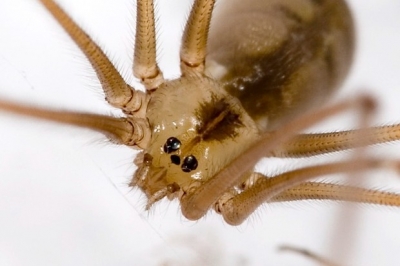
There are about 40,000 species of spiders and nearly all of them have poison glands. Fortunately, in most cases the venom is very weak and has little or no effect on man. The bite of the tarantula was once thought to cause a disease called tarantism when the victim wept and danced wildly. Now it is known that the bite is not dangerous to man.
A few spiders, however, can injure people. One of these is the black widow which lives in North America. Its bite can cause intense pain, severe illness and even death, though this is rare.
In actual fact the mouth of a spider is made in such a way that it cannot really bite. These animals use their venom as a chemical to paralyze their victim. Scientists have found that the venom of spiders in some species breaks down the tissues of the victim and turns them into a sort of jelly which the spider then sucks up because it has no means of chewing its food.
If a spider is not hungry it does not kill its victim immediately. Instead, it imprisons it by wrapping a thick web of threads round it, waiting for the right moment to inject its venom.
Picture Credit : Google
